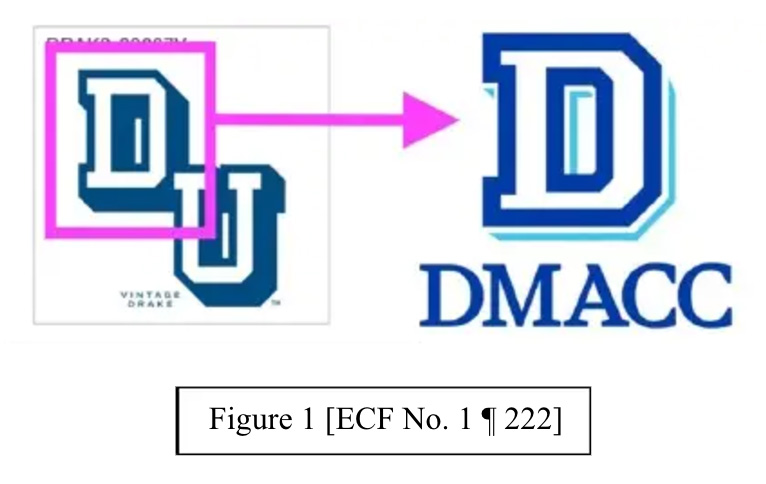A federal judge has ordered Des Moines Area Community College to cease the use of their new ‘D’ logo. The decision comes after Drake University requested an injunction as part of its copyright lawsuit filed in July.
According to a ruling issued by U.S. Chief District Judge Stephanie Rose on Nov. 22, DMACC has until Dec. 12 to remove the new logo and branding from its campuses and official merchandise.
The case isn’t over yet
While the lawsuit is far from concluded, this ruling puts Drake one step closer to winning the lawsuit. A federal judge needs a strong reason to believe that one side is “likely to prevail” in order to issue a preliminary injunction.
This new injunction is based on the court’s conclusion that Drake presented substantial evidence for copyright infringement.
“[DMACC is] enjoined from using a block-style ‘D’ trademark in conjunction with any color combination of white and blue to denote their educational services, athletics or ancillary goods and services. This includes the use of such a ‘D’ even when it is paired with a DMACC house mark or other indicia of the college,” Rose wrote in her ruling, which was provided to The Times-Delphic through a Freedom of Information Act request.
Rose wrote that there is a heightened risk of the general public mistaking the two schools due to DMACC’s “rapid growth and expansion,” including offering courses that overlap with Drake.
“Although DMACC has a right to compete [against Drake], the public interest is best served by requiring it to do so under distinct branding that allows prospective students to make informed choices between institutions,” Rose wrote.
DMACC President Robert Denson said in an email to The Times-Delphic he does not agree with the court’s decision but respects the ruling.
“Although not the outcome we’d anticipated, we do appreciate the time and analysis contained in the Court’s order,” Denson said.
Rose acknowledged that, above all else, the root of the question comes down to whether Drake has a valid common law trademark of the solo ‘D’ and if DMACC infringed on that copyright, intentionally or by accident. Drake claims it does because the institution has used the standalone ‘D’ since 1902.
“Given the nearly identical colors DMACC chose in its rebrand, it is difficult to see how this is not persuasive evidence of intentional copying,” Rose wrote.
The court order mentions that Drake technically does not have its vintage ‘D’ registered as a trademark but does have logos consisting of Spike and Griff wearing the vintage ‘D’ that are officially registered trademarks.
Santa’s legal analysis
Despite ultimately siding with Drake, Rose did criticize some of the evidence Drake presented in its initial lawsuit — particularly the evidence presented in what Drake dubbed “The Rotary Club Incident.”
In the initial lawsuit, Drake pointed to a holiday party hosted by the Rotary Club of Des Moines in December of 2023. Part of the event included attendees sitting on Santa Claus’ lap and receiving white elephant gifts.
When DMACC’s Director of Marketing Todd Jones sat on Santa’s lap, Santa made a joke about both schools’ logos looking similar and presented Jones with a copy of “Trademark and Copyright Infringement for Dummies.” Drake claimed this was substantial evidence that the public was on their side.
Rose wrote that the incident was nothing more than a premeditated prank that could only be evidence of “cleverness on the part of some Rotary Club members” but could not be a reliable basis to determine intellectual property rights.
“There is no basis to discern whether the response in the room was [in] agreement with Santa’s legal analysis, or merely the response of a jolly cocktail hour crowd during a holiday party,” Rose wrote. “In other words, this is not an accurate representation of public perception adequate to constitute evidence of actual confusion.”
Rose also ruled that Drake’s attempt to use public Facebook comments that pointed out the similarities was not substantial enough.
“The individuals commenting on Facebook were self-selected. They reflect the opinions of those who chose to opine on the topic and do not necessarily reflect an accurate sampling of the public or potential consumers,” Rose wrote.
Rose also pointed out a segment that aired on KCCI after the lawsuit was filed that shows a reporter interviewing people around Des Moines asking them to tell the difference between the two logos.
“The Court was provided very little information about KCCI’s interviews. The video clip portrays two individuals allegedly confusing DMACC’s new mark as Drake’s Vintage ‘D,’” Rose wrote. “There is no way for the Court to determine if this data was adequately and impartially collected.”
Rose went on to say that while Drake had no legal obligation to demonstrate incidents of actual confusion in order to establish the likelihood of confusion, it still “failed to do so.”
What happens next?
It is unclear at this time what will happen moving forward. Denson said DMACC is considering its options.
“DMACC is consulting with our attorney as to next steps, and DMACC will continue to work with Drake in ways that support students,” Denson said.
Drake President Marty Martin praised the court’s ruling but also did not offer a timeline as to what will happen next regarding the lawsuit.
“We are pleased with the court’s decision and are hopeful we can now move on from the matter,” Martin said in an email.
Per the Federal Rules of Civil Procedure — which require someone who petitions a court to pay “security in an amount that the court considers proper to pay the costs and damages sustained by any party found to have been wrongfully enjoined or restrained” — Drake is ordered to pay a bond of $25,000 to the United States District Court for the Southern District of Iowa until such time the lawsuit is resolved.
If DMACC wins the lawsuit, they will receive the bond for being wrongfully restrained; if Drake wins, the money will be returned.







